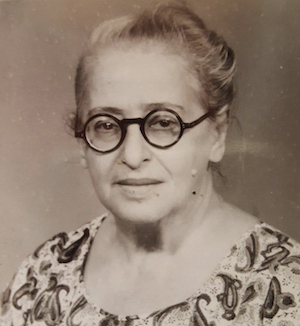
|
|
|
|
|
| Issue 26: | 1 Jan.2025 |
| Lyric Essay: | 475 words |
By Roseanne Freed
Ashkenazi Jewish families honor relatives
who’ve passed away by naming a baby in their memory. I was named after the movie Rosanna and the Seven Moons. A movie I’ve never seen? Why not someone I could see in our photo album?
A few years after my daughter graduated from medical school, Prof Jeffery at Edinburgh University found our family tree online and reminded us she wasn’t the first female doctor in the family—and I wasn’t the first Rose:
We are undertaking an academic research project about women who qualified as doctors in the early days for women about 1885–1914. One of them is a Rose Moskovitch born we think in Pune, India in 1887. She qualified in Bombay in 1908 and we believe she lived in Pune for the rest of her life. We are based in UK and find it very difficult to find Jewish info in India. Do you have any information about her?
My maternal grandmother’s first cousin Rose Moskovitch was born in 1887, the fourth of nine children in a religious Jewish home in Poona. Her parents and their siblings all escaped the pogroms in Moldova and moved to India: her father, Chaim, a.k.a the horse whisperer, had a bakery in Poona; his younger brother, my great-grandfather Harry, a.k.a the scholar, had a bakery in Bombay. Rose finished high school at the age of thirteen and qualified as a doctor at eighteen, but in 1905 a female’s medical degree was not recognized in Bombay. When London universities also rejected her application she went to Edinburgh, Scotland to complete formal registration requirements.
Intelligent, independent, and indomitable, she earned a British Degree and graduated in 1910 with a joint qualification of physician and surgeon to become one of the first lady doctors in India. She worked in hospitals for a few years before opening her own private practice in Gynecology and Obstetrics.
Rose loved to dress up in fashionable clothing and go partying, had several beaux but never married (I heard a rumor that she fell in love with a man who wasn’t Jewish, but her parents disapproved of marriage outside the faith), and always kept many dogs. My cousin Alex told me that when he and his father (her nephew) visited Doctor Rosie, they usually were forced to stand or sit on the floor, because the dogs were on the chairs.
After she was given the honorable position of delivering all the Maharajah’s babies, she drove around Poona with her dogs in one of her many Rolls-Royces. All given to her as gifts after each birth, along with silver, Persian carpets, and jewelry—only commoners dealt with cash.
To visit Poona
(not Pune) with my namesake
Rose. My deepest wish.

Dr. Rose Moskovitch (8 May 1887 – 20 January 1960);
Poona, India (year unknown) by unknown photographer.
Image appears here with Roseanne Freed’s permission.
Publisher’s Notes:
1. One of two major ancestral groups of Jewish people, Ashkenazi refers to those whose ancestors lived in France and Central and Eastern Europe, including Germany, Poland, and Russia. The second group, Sephardic Jews, includes those whose ancestors lived in Spain, Portugal, North Africa, and the Middle East (source: Wikipedia).
2. Often referred to as the Oxford of the East, Pune is the cultural capital of Maharashtra in western India and its second largest city (the largest being Mumbai). The name Poona is the Anglicized version of the Marathi name Pune and was widely used during British colonial rule (1818-1947). The earliest references to the city, at the time a settlement called Punaka, are found in copper plates dated 758 and 768 C.E. Partly because the name Poona has been perpetuated in literature, films, and media, it remains in common usage, especially by those who’ve lived under British influence, even after the official name reversion to Pune in 1978 (source: Wikipedia).
Roseanne Freed
was born and grew up in apartheid South Africa, raised her children in Canada, and has lived in the United States for 25 years. She is a Best of the Net and Pushcart nominee, whose poems have appeared in Blue Heron Review, Contrary Magazine, Literary Mama, MacQueen’s Quinterly, Naugatuck River Review, ONE ART, Silver Birch Press, The Jewish Writing Project, and Verse-Virtual among others. Her chapbook, Your Name Is a Poem (Picture Show Press, 2024), tracks the final illness of her daughter, Mahalia, the mother of two young children.
Roseanne and her husband live in Los Angeles, where she shares her love of the outdoors by leading children on hikes in the Santa Monica mountains.
More on the Web: By, About, and Beyond
⚡ Where’s Jeffrey?: CNF by Roseanne Freed in Issue 22 of MacQueen’s Quinterly (February 2022); nominated by MacQ for Best of the Net 2025, the Sundress Publications annual athology
⚡ Your name is a poem, in Issue 15 of MacQ (September 2022)
| Copyright © 2019-2025 by MacQueen’s Quinterly and by those whose works appear here. | |
| Logo and website designed and built by Clare MacQueen; copyrighted © 2019-2025. | |
|
Data collection, storage, assimilation, or interpretation of this publication, in whole or in part, for the purpose of AI training are expressly forbidden, no exceptions. |
At MacQ, we take your privacy seriously. We do not collect, sell, rent, or exchange your name and email address, or any other information about you, to third parties for marketing purposes. When you contact us, we will use your name and email address only in order to respond to your questions, comments, etc.